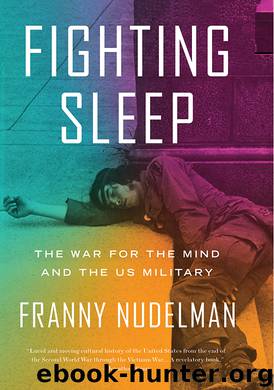Fighting Sleep by Franny Nudelman

Author:Franny Nudelman
Language: eng
Format: epub
Publisher: Verso Books
PART II:
EXPERIMENTS IN ACTIVISM
On April 21, 1971, members of the VVAW defied the Supreme Court by falling asleep on the National Mall. In the second half of Fighting Sleep, I argue for the importance of this moment in the history of antiwar activism and explore the process through which the VVAW arrived at its utopian assertion of the right to public sleep. The language of sleep, dreams, and especially awakening permeated the social movements of the post–World War II era, reflecting a commitment to a politics rooted in awareness. When antiwar veterans spoke about their war experiences, these figures were employed loosely to signify indoctrination as well as the will to knowledge, the persistence of traumatic symptoms, and the desire for emotional peace. Generally, sleep states lend themselves to a kind of figurative promiscuity: precisely because it is experientially indeterminate, sleep is the stuff of metaphor, used variously to symbolize imaginative freedom, death-like inertia, private memory, and more. The language of sleep is virtually meaningless if not situated in relation to historical practices that allow us to reconnect what sleep means to how and where it has been used.
To this end, I consider the struggle over sleep at Dewey Canyon III in relation to the activist program of the VVAW, which employed the symptoms of traumatic memory—recurrent nightmares, insomnia, and flashbacks—to document the institutional production of war atrocity and build political community; their tactics shed light on the rhetorical force of sleep and its relevance as a form of direct action. In the broader context of radical organizing, agitating for the right to public sleep is a way to assert the importance of physical well-being in the face of state efforts to control sleep—which frequently, as Reiss observes, deny the “time, space, and security” needed for sleeping to those who are most vulnerable.1 Examining the confrontation over sleep at Dewey Canyon III in relation to the VVAW’s innovative and influential approach to antiwar activism, I ask more broadly: how have sleep states been expressly politicized and used to build and sustain social movements?
Published in 1980, the Diagnostic and Statistical Manual of Mental Disorders III (DSM-III) lists “difficulty falling or staying asleep” as one of five primary markers of post-traumatic stress disorder (PTSD)—a diagnostic category drawn largely from the experiences of Vietnam veterans.2 For veterans, chronic insomnia resulted, on one hand, from the habitual vigilance that combat required and, on the other, from the threat of recurrent nightmares. A 1998 study of sleep disturbances among Vietnam veterans, for example, found that “combat exposure was strongly correlated with frequency of nightmares” and speculated that “sleep onset insomnia in PTSD subjects is driven predominantly by sleep phobia resulting from the experience of frequent nightmares.”3 In essence, insomniac veterans are afraid of their own memories and thus involuntarily avoid falling asleep. As one Vietnam veteran reported, “Sometimes I just stay up half the night and cannot go to sleep because my mind bleeds from hell when it goes back to Vietnam.”4
Plagued by nightmares when
Download
This site does not store any files on its server. We only index and link to content provided by other sites. Please contact the content providers to delete copyright contents if any and email us, we'll remove relevant links or contents immediately.
| Arms Control | Diplomacy |
| Security | Trades & Tariffs |
| Treaties | African |
| Asian | Australian & Oceanian |
| Canadian | Caribbean & Latin American |
| European | Middle Eastern |
| Russian & Former Soviet Union |
The Secret History by Donna Tartt(18998)
The Social Justice Warrior Handbook by Lisa De Pasquale(12177)
Thirteen Reasons Why by Jay Asher(8874)
This Is How You Lose Her by Junot Diaz(6857)
Weapons of Math Destruction by Cathy O'Neil(6248)
Zero to One by Peter Thiel(5766)
Beartown by Fredrik Backman(5717)
The Myth of the Strong Leader by Archie Brown(5481)
The Fire Next Time by James Baldwin(5409)
How Democracies Die by Steven Levitsky & Daniel Ziblatt(5200)
Promise Me, Dad by Joe Biden(5130)
Stone's Rules by Roger Stone(5065)
A Higher Loyalty: Truth, Lies, and Leadership by James Comey(4937)
100 Deadly Skills by Clint Emerson(4899)
Rise and Kill First by Ronen Bergman(4758)
Secrecy World by Jake Bernstein(4727)
The David Icke Guide to the Global Conspiracy (and how to end it) by David Icke(4685)
The Farm by Tom Rob Smith(4487)
The Doomsday Machine by Daniel Ellsberg(4473)
